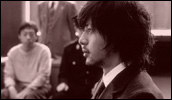Sway
- Year
- 2006
- Original title
- Yureru
- Japanese title
- ゆれる
- Director
- Cast
- Running time
- 120 minutes
- Published
- 13 September 2006



by Tom Mes
A film set partially in a courtroom is not necessarily a 'courtroom drama'. A film revolving around a murder investigation is not necessarily a 'murder mystery'. Elementary knowledge for a film critic, one supposes, but knowledge that seems to have slipped the minds of most critics who reviewed Miwa Nishikawa's Sway, the only Japanese feature film selected for the 2006 Cannes film festival.
Sway follows Takeru (Odagiri), a successful big city photographer for trendy magazines. He looks the part, seems every bit the urban hipster. But the big city boy has small town roots, as we learn when a call comes that Takeru's mother has died. Driving his vintage car to his hometown, he arrives late for the funeral services, still wearing his leather jacket and crimson pants.
During that night's get-together, the frustrations that have built over years inside Takeru and his father (Ibu) come to the surface. The patriarch's sarcastic remark that he had to cut-and-paste his wife's funeral portrait, while his son is playing photographer in faraway Tokyo, is met with an offhand "You could have taken her picture anytime by yourself" from the son. Lightning strikes and the two would be at each other's throats if it weren't for the intervention of older brother Minoru (Kagawa) - the man of compromise, the son who stayed at home and accepted his father's wishes to take over the family business. He runs the ugly gas station that stands forlornly on the edge of town, a concrete plot shot in grayish tints that serves as a symbol for all the petty, boxed-in, small-town misery that Takeru escaped from. But Minoru has his own frustrations, above all with being treated as everyone's doormat as a result of his eagerness to compromise. One day he snaps and attacks a client's windshield with the fuel pump.
Takeru's homecoming is also an opportunity to meet with Chieko, a pretty ex who works at the gas stand but dreams of a better life in Tokyo. Though everyone seems to expect her to marry and settle down with Minoru, she is on Takeru's side and wants desperately to emulate his achievements. They spend a night together, but he wishes to go no further. He ignores her plea to take her with him to Tokyo and leaves her small apartment before dawn breaks. Waking up to find him gone, she smells his discarded cigarette packet, in some vain hope of getting closer to everything it (and he) represents. She can't stay. Even if she likes Minoru and he obviously likes her, the prospect of living the rest of her life like her parents is unbearable. She decides to persist in her efforts to convince Takeru, her only ticket to a better life. The three of them go out on a trip to a nearby forest and river. Takeru trails off by himself to take pictures. Minoru and Chieko cross the dangling rope bridge. An argument ensues: she rebuffs the older brother's advances, reveals her liaison with Takeru, as well as her wish to leave town and never come back. He wants to grab her arm, she pulls back and slips. A few seconds later, her dead body is floating downstream. The police investigate and Minoru is arrested. Did he push her, or did she fall? What did Takeru see and hear from his isolated vantage point on the other shore?
Whether Minoru pushed or Chieko slipped is not the issue of the film. Takeru's memories of the event are what matters. Or more precisely, what the selectiveness of that memory says about him, his feelings about his family, the choices he made in life, and the guilt he felt for those choices somewhere deep down, which he is now no longer able to suppress. To condemn his brother means to get back in his snazzy car, drive to Tokyo, and burn his bridges, leaving the misery of his youth behind him for good and embracing a glamorous life as a hip photographer. But it also entails denying his roots, his true identity. Getting Minoru off the hook is his only chance to make peace with his past.
Sway is a film on the gaping chasms between countryside and city, between family life and 'freeter' existence, between patriarchy and individualism. Between an old Japan that refuses to go away and the young who desperately wish it would but who lack the strength and the ideas to speed up the process. The difference may only be a more glamorous shade of dull. The Takerus of this world may have turned their backs on their fathers, but they have no alternative to offer themselves or their generation, let alone the generations that are to follow. What they have is superficial, hedonistic: fashion, consumption, glossy magazines, acting cool. When the basis is unstable, the swaying starts. Miwa Nishikawa's Sway is about Japan today - questioning, investigating, challenging, perceptive. Do we call that a courtroom drama and dismiss it for not playing like an episode of Law & Order? Who's Camus anyway?